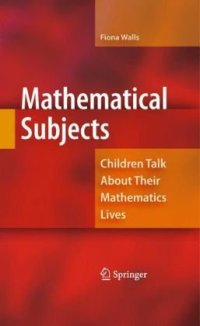
Ebook: Mathematical Subjects: Children Talk About Their Mathematics Lives
Author: Fiona Walls (auth.)
- Genre: Mathematics
- Tags: Mathematics Education, Childhood Education
- Year: 2009
- Publisher: Springer US
- Edition: 1
- Language: English
- pdf
We know the process by which children become social, moral, and creative beings, but when—and how—do they become mathematical beings? This thought-provoking volume follows ten children (ages seven through eighteen) in schools in New Zealand, England, Australia, Sweden, and an international school in Switzerland as they come to recognize the mathematical as part of their lives, their academic identities, and their identities as human beings. Through these students’ experiences important themes emerge, including mathematics as work, a domain of learning, and an avenue for competition; mathematical ability as a key to how they are perceived by others; and the relationships between mathematics achievement and the larger social and academic picture. This comparative study of educational systems and academic development will inform readers in these and other salient areas:
- Theoretical bases for understanding children as mathematical subjects.
- Help in creating the mathematical self: tutoring and related programs.
- The roles of compulsory study and standardized assessment.
- Class and ethnic content in children’s math narratives.
- The gendering of mathematical ability and activity.
- What children’s math experience can teach us about teaching the subject.
Children Talk about Their Mathematics Lives opens bold windows onto how young people learn and how disparities arise, making it a cutting-edge resource for researchers and libraries, graduates and teachers in mathematics education and early childhood education.
This book is an essential read for all parents, teachers and academics who have an interest in children's learning. Although the book focuses on mathematics in the early years it is more than just mathematics, it's about what happens in the classroom, at home and amongst friends that excites or disenchants children when they learn. Most importantly this research clearly articulates the point of view of the child. Few researchers these days take the time that this researcher has taken to give us a unique insight over an entire schooling career into the learning of mathematics and even fewer provide such a strong voice of children. This is a very accessible study and never before have I seen Foucault used in such an insightful and enthralling way. Read and listen to the voices of the children!